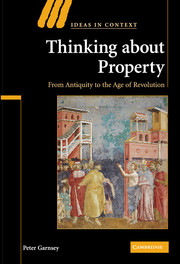Book contents
- Frontmatter
- Contents
- Abbreviations
- Preface
- Introduction
- Chapter 1 Plato's ‘communism’, Aristotle's critique and Proclus' response
- Chapter 2 Plato's ‘communism’: from late antiquity via Islamic Spain to the Renaissance
- Chapter 3 Renunciation and communality: thinking through the primitive Church
- Chapter 4 The poverty of Christ: crises of asceticism from the Pelagians to the Franciscans
- Chapter 5 The state of nature and the origin of private property: Hesiod to William of Ockham
- Chapter 6 The state of nature and the origin of private property: Grotius to Hegel
- Chapter 7 Property as a legal right
- Chapter 8 Property as a human right
- Conclusion
- Bibliography
- Index
Chapter 7 - Property as a legal right
Published online by Cambridge University Press: 22 September 2009
- Frontmatter
- Contents
- Abbreviations
- Preface
- Introduction
- Chapter 1 Plato's ‘communism’, Aristotle's critique and Proclus' response
- Chapter 2 Plato's ‘communism’: from late antiquity via Islamic Spain to the Renaissance
- Chapter 3 Renunciation and communality: thinking through the primitive Church
- Chapter 4 The poverty of Christ: crises of asceticism from the Pelagians to the Franciscans
- Chapter 5 The state of nature and the origin of private property: Hesiod to William of Ockham
- Chapter 6 The state of nature and the origin of private property: Grotius to Hegel
- Chapter 7 Property as a legal right
- Chapter 8 Property as a human right
- Conclusion
- Bibliography
- Index
Summary
HISTORIOGRAPHICAL BACKGROUND
In 1840 Pierre-Joseph Proudhon of Besançon, a printer and an autodidact, published What is Property? and answered his own question: ‘Property is Theft.’ Karl Marx was twenty-one years of age at the time, and writing his dissertation for the University of Jena on the difference between the natural philosophy of Democritus and of Epicurus. After a brief opening chapter on methodology, Proudhon moves on to definitions. He begins in this way:
‘Roman law defines property as the right to use and abuse a thing within the limits of the law’ – and he provides the Latin: ‘Jus utendi et abutendi re sua, quatenus iuris ratio patitur.’ Abuse of property, he says sardonically, is really indistinguishable from use of property. One way or another, the proprietor can do what he likes with his land. He can ‘let the crops rot underfoot, sow his field with salt, milk his cows on the sand, turn his vineyard into a desert, and use his vegetable garden as a park’.
Further definitions follow. According to the Declaration of Rights, published as a preface to the French Constitution of 1793, property is ‘the right to enjoy and dispose at will of one's goods, one's income, and the fruit of one's labour and industry’.
- Type
- Chapter
- Information
- Thinking about PropertyFrom Antiquity to the Age of Revolution, pp. 177 - 203Publisher: Cambridge University PressPrint publication year: 2007



